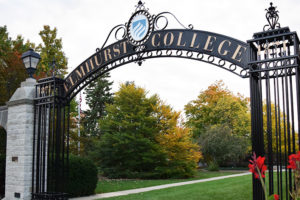
We are in the middle of one of the country’s “great civil rights movements”— the struggle for full recognition of the God-given humanity of people who are gay, lesbian, bisexual or transgendered, said V. Gene Robinson, Episcopal bishop of New Hampshire.
Before a crowd of several hundred in Hammerschmidt Memorial Chapel on October 4, Robinson talked about the role of religion in largely bringing about the current climate of “demonization and polarization” toward LGBT people, as well as what “people of good will and good faith, any faith, might do to change this climate.”
Robinson was the first openly gay priest to be named bishop among any of the traditional Christian denominations. His election in 2003 triggered turmoil in the U.S. Episcopal community as well as in the worldwide Anglican Communion, leading to years of argument over the proper role, if any, of homosexual persons within the apostolic succession.
Since his election, Robinson has been an outspoken advocate for civil rights and marriage equality for LGBT people. During his daylong visit to Elmhurst, which included campus meetings with students and a worship service with parishioners of the Episcopal Church of Our Saviour, which co-hosted his visit, Robinson talked about the importance of viewing the Bible in context with regard to homosexuality, and considering “what the Bible really says, as opposed to what other people tell us it says.”
He noted that many of the prohibitions described in the Book of Leviticus—such as those against eating shellfish or pork, wearing two kinds of cloth at the same time, and planting different kinds of seed in the same field—no longer are taken literally. Yet the few biblical mentions of what we now might consider homosexual activity still are held as binding by many people of faith. “We can’t have it both ways: It is either all true, or it all must be read in context.”
Robinson urged his audience to engage actively in the movement toward full rights for LGBT people. “We have to stop protecting ourselves from knowing about the pain of others,” he said. “It’s not enough to love justice. You must do justice.”
He said the gay community needs strong and vocal allies in the straight community. Too many churches have adopted an attitude of mere tolerance and think the job is done.
“I’m not all that excited about tolerance. It’s not enough. It sets the bar too low,” he said. “Wouldn’t it be wonderful if our churches, synagogues and mosques led the way instead of bringing up the rear?”
Just as with racism and sexism, he said, “we have to understand the systemic origin of the world we live in. We have to think about who benefits and who pays the price for the status quo.
“If it benefits the straight community at the cost of the homosexual community, then it is heterosexism,” he declared. Giving a personal example, Robinson described an encounter with U.S. Customs officials on his return to the United States after a trip abroad with his husband. The officials refused to recognize Robinson’s marriage, but recognized that of a heterosexual couple returning from their honeymoon. “It’s a system set up to remind us that our family doesn’t really count,” he said.
In his introductory remarks, President S. Alan Ray noted the College’s move to the forefront of efforts to remind young LGBT people that they do count. Last year, Elmhurst became the first college in the nation to ask applicants whether they consider themselves to be a member of the lesbian, gay, bisexual or transgender community.
Robinson, 65, recently announced that he will retire early next year, but he is unlikely to be leaving public life. Robinson is the subject of a new documentary, Love Free or Die: How the Bishop of New Hampshire Is Changing the World, which premiered at the Sundance Film Festival earlier this year. The Bishop’s latest book, God Believes in Love: Straight Talk about Gay Marriage, was released last month.
“My job,” Robinson said, “is to sing my song as clearly as I can. …We will never be more than a small minority. We need you, our heterosexual allies, to be passionate, the way some white people were passionate about marching with Martin Luther King.
“We need each of you to decide what role you will play in this civil rights movement of our time.”